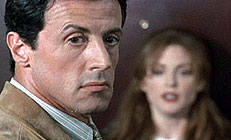|
|
|
|
Assassins
|
 |
|
I never thought I would say this about a film directed by Richard Donner of Lethal Weapon (1987) fame, but Assassins is one of the best action movies of the '90s. In the world of this tale, people are either assassins or marks (i.e. targets) – and Robert (Sylvester Stallone) discovers he is both, pursued by the mad young monkey Miguel (Antonio Banderas). To make matters worse, Robert finds himself uncannily reliving, in this Caribbean showdown, his own traumatic 'primal scene' from fifteen years previously. But that's the second half of the story. Before this ultimate clinch, the two first tangle when they converge on the same mark – a steely techno-whiz named Electra (Julianne Moore), who has a few tricks of her own. She's the soul sister of Sandra Bullock's character in The Net (1995), and obviously a new popular archetype: the lone, career-minded, cyber-hacker gal with a shadowy identity and a cat. There are obvious echoes of John Woo's The Killer (1989), Luc Besson's The Professional and Quentin Tarantino's Reservoir Dogs (1992) here – even of Orson Welles' Mr Arkadin (1955) or Sergio Leone's Once Upon a Time in America (1984) in its theme of a past life relived and a final back-from-the-dead twist – but this is not a movie of self-conscious homages or quotations. It is a superbly orchestrated action spectacular in the vein of Speed (1994), with a narrative drive that never falls away, and a moment-to-moment inventiveness that is utterly breathtaking. Donner's collaborators (including cinematographer Vilmos Zsigmond and composer Mark Mancina) have helped create a dense, always intriguing texture of details, atmospheres and split-second narrative possibilities. The lighting, the soundscape (including an ingenious use of silence) and the camera moves are all notable here. We have seen many films lately, in the wake of John Badham's Stakeout (1987), attempting to alternate action with comedy, often with very clumsy results. Here, the humour – particularly in the wonderful exchanges between Robert and Miguel – hits a pleasurably off-beat register, drawing us further into the tensions and surprises of the story. This is a film that brandishes its more outlandish plot elements (such as Electra's cat) with real élan. New technological gadgetry, too, has rarely been so well integrated into the busy thrust of an action narrative. The constant use by all three main characters of computers, communications and surveillance devices is a pleasurable enough spectacle in itself. But Donner and his three script writers also cleverly connect such modern paraphernalia to a classic motif of the 'film noir' genre: the imminent treachery built into all power games. The movie plays, lightly but satisfyingly, on the ambiguity and malleability of identity in modern cyberspace. After his disappointing role as Judge Dredd (1995), Stallone fully redeems himself as a performer here. Whether being iconic or just plain laconic, he is superb. Moore has a fascinating character in Electra, but unfortunately she gets weaker, less active and capable, as the story proceeds. The film does not try very hard to be a genuine three hander. But ultimately Assassins belongs to Banderas. This is his breakthrough part in American movies, and he makes it a dazzling, virtuoso showcase for himself – by turns sexy, crazy, brooding, comic and heart-stoppingly thrilling. Donner embraces even the actor's still thick Spanish accent, thus accentuating the humour and disconcerting strangeness of Antonio's prodigious vocal outpourings: jabbering, cursing, exclaiming, clicking his tongue. Some recent action movies, such as Kathryn Bigelow's marvellous Blue Steel (1990), have carried a special, extra resonance. Assassins lacks that sort of richness, but in its own terms it is a perfect, and perfectly satisfying, piece of work. MORE Donner: Ladyhawke, Conspiracy Theory © Adrian Martin October 1995 |
![]()